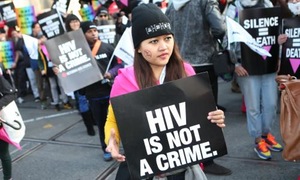
Victoria has moved to repeal a law making it an offence to intentionally infect another person with HIV.
Under section 19A of the Crimes Act it has been an offence to intentionally infect another person with a “very serious disease”, defined exclusively to mean HIV. The offence, introduced in 1993 and due to be abolished on Tuesday, carried a jail term of 25 years.
It was Australia’s only remaining HIV-specific law that criminalised the intentional transmission of the virus and has never been used in the circumstances for which it was originally intended – the deliberate transmission of HIV by a blood-filled syringe.
New South Wales repealed its HIV-specific law in 2007.
At the the Aids 2014 symposium in Melbourne last year, the former state government committed to reviewing the legislation, saying it had been used only once.
On Tuesday Victoria’s attorney general, Martin Pakula, said people living with HIV were entitled to equality before the law.
“This is another step forward in ensuring that,” he said. “This is about reducing the stigma and discrimination faced by people living with HIV, and in turn promoting equal protection by the law of all Victorians.”
Intentionally infecting another person would still be a crime as it is covered under other legislation, including causing serious injury, which carries a penalty of up to 20 years in jail.
The executive officer of Living Positive Victoria, Brent Allan, said the existence of the section 19A offence had created a barrier to people getting tested and treated for HIV. The Joint United Nations Programme on HIV/Aids and the Global Commission on HIV and the Law both state that HIV-specific criminal laws are counterproductive to prevention efforts.
“It creates a fear in living with HIV because people worry they could be prosecuted, that someone may falsely accuse them of deliberately infecting them,” Allan said. “So people think, ‘Well, if I never get tested, then I’ll never know I have HIV and can’t be charged.’
“We know it’s a deterrent to testing, and around the world where laws like this are repealed, testing rates increase. Now, another barrier to testing will be gone.”
Most HIV infections were spread by people who were unaware they had the virus, Allan said, with less than 1% coming from people who knew they were HIV positive.
Allan has long advocated repeal of the law and said he was overjoyed that the government was finally legislating to change it.
“I am so proud to be a Victorian who is living in a progressive state where there is a government who understands these laws are not good for public health and who have taken steps to change this,” he said.
“Amending laws happens all the time but repealing them is very hard to do, and I am so glad there has been a recognition of the human rights implications of this offence, which was really driven by the international Aids conference being held in Melbourne last year.”
Deliberately infecting someone with HIV is prosecuted in different ways around the world but often falls under existing criminal acts and therefore does not require specific legislation.
Last year, Uganda policymakers were criticised for making the wilful and deliberate transmission of HIV a crime.
A US Centers for Disease Control and Prevention analysis found that by 2011, 67 laws explicitly focused on people living with HIV had been enacted in 33 states.
In the UK, deliberate infection most often falls under reckless conduct.
